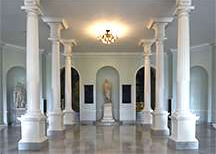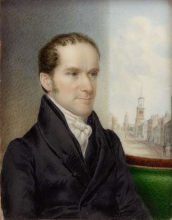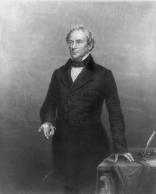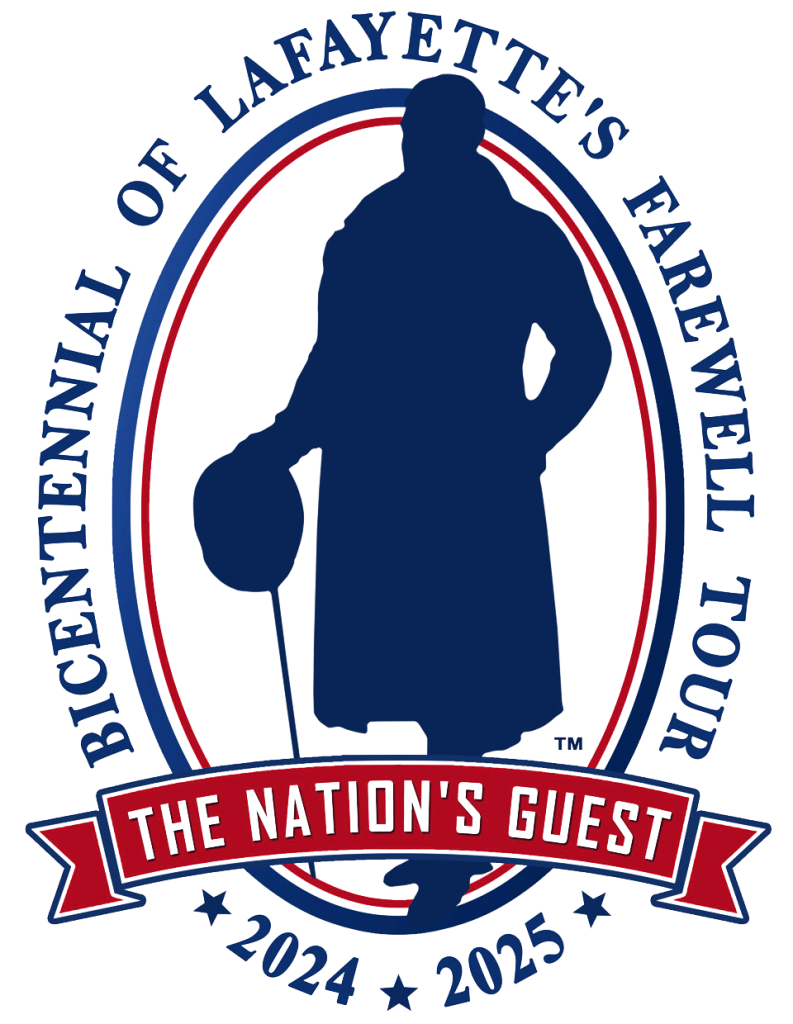This is part of a series on Lafayette’s visit to Massachusetts August 23, 1824 to September 3 1824
In the morning Lafayette met with delegations from Brown University and others. He then went to the Doric Hall of the State House where he shook hands with nearly two thousand citizens.

Doric Hall
Several veterans of the Revolution were among those greeting him including some from Lafayette’s light infantry. There was much comment of the approving sort when Lafayette shook hands with a black man named John Harrison who had once waited on Lafayette, when he resided at the house of Mr. Breck in Boston.
At noon Lafayette left for Cambridge to attend the Exercises of the Phi Beta Kappa Society. The Graduate Society of Phi Beta Kappa at Harvard held its usual business meeting and then waited an hour till 1:00 PM for Lafayette and his entourage to arrive for the public exercises and banquet that followed.
264 members of the society proceeded to the meetinghouse (now the location of Lehman Hall) making the whole number 300. Reverend James Walker (1794-1874) made a prayer of five minutes.

James Walker
Reverend Henry Ware Jr. (1794-1843) delivered a poem “The Vision of Liberty” he had to compose on short notice. Ware was the minister of the Unitarian Second Church in Boston. He was a mentor to Ralph Waldo Emerson (1803-1882), who would succeed him at Second Church. He and Emerson fell out after Emerson’s famous divinity school address in 1838.

Henry Ware Jr circa 1828
Here is the final stanza of “Vision of Liberty” to give you a taste of it.
Accomplish they design;
And let the blessing thou has freely given,
Freely on all men shine;
Till equal rights be equally enjoy’d,
And human power for human good employ’d;
Till law, not man, the sovereign rule sustain;
And peace and virtue undisputed reign
The big event was a nearly two-hour lecture by Edward Everett (1794-1865). Edward Everett was one of the great orators of his time. Ironically he is most remembered today for what followed his two hour speech on November 19, 1863 at the dedication of the National Cemetery in Gettysburg PA – a two minute speech by then President Abraham Lincoln which was predicted to be little noted nor long remembered. By the way it is not hard to find a copy of Everett’s Gettysburg speech, and it is a really good read – just saying.

Edward Everett
Everett’s speech this day in 1824 was on the subject of “The peculiar motives to intellectual exertion in America”. In his New York Times obituary in 1865, there is an evaluation of the presentation drawn from the New American Cyclopaedia.
“In 1824 he made his first essay in that department of demonstrative oratory, which he has since cultivated with such signal success, by the delivery of a discourse before the Phi Beta Kappa Society on the “Circumstances Favorable to the Progress of Literature in America.” An immense audience came to hear him, attracted partly by his own fame, and partly by the wish to behold LAFAYETTE, who was present at the orator’s side. He was heard with the greatest enthusiasm and delight. Our own recollections confirm the strong statements of a writer in the Christian Examiner for November, 1850: ‘The sympathies of his audience went with him in a rushing stream, as he painted in glowing hues, the political, social and literary future of our country. They drank with thirsty ears his rapid generalizations and his sparkling rhetoric. The whole assembly put on one countenance of admiration and assent. As with skillful and flying hand the
orator ran over the chords of national pride and patriotic feeling, every bosom throbbed in unison to his touch; and when the fervid declamation of the concluding paragraph was terminated by the simple pathos of the personal address to LAFAYETTE, his hearers were left in a state of emotion far too deep for tumultuous applause.’”
Here is the personal address to Lafayette that closed the speech.
“Welcome, friend of our fathers, to our shores. Happy are our eyes that behold those venerable features. Enjoy a triumph, such as never conqueror or monarch enjoyed, the assurance that throughout America, there is not a bosom, which does not beat with joy and gratitude at the sound of your name. You have already met and saluted, or will soon meet, the few that remain of the ardent patriots, prudent counsellors, and brave warriors with whom you were associated in achieving our liberty. But you have looked round in vain for the faces of many, who would have lived years of pleasure on a day like this, with their old companion in arms and brother in peril. Lincoln, and Greene, and Knox, and Hamilton are gone; the heroes of Saratoga and Yorktown have fallen, before the only foe they could not meet. Above all, the first of heroes and of men, the friend of your youth, the more than friend of his country, rests in the bosom of the soil he redeemed. On the banks of his Potomac, he lies in glory and peace. You will revisit the hospitable shades of Mount Vernon, but him whom you venerated as we did, you will not meet at its door. His voice of consolation, which reached you in the Austrian dungeons, cannot now break its silence, to bid you welcome to his own roof. But the grateful children of America will bid you welcome, in his name. Welcome, thrice welcome to our shores; and whithersoever throughout the limits of the continent your course shall take you, the ear that hears shall bless you, the eye that sees you shall bear witness to you, and every tongue exclaim, with heartfelt joy, welcome, welcome La Fayette !”
After that a party of 200 dined together at University Hall. It was a first that people not members of the society were included in the dinner. Reverend Ware asked the blessing and Dr. John Lowell returned thanks. As was usual there were numerous toasts.
For information on the bicentennial of Lafayette’s tour check out lafayette200.org.































































































